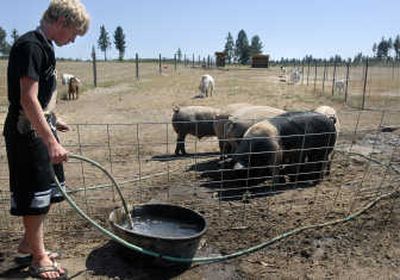Land of opportunity

Angie Fultz knew what she was doing wasn’t working.
Pulling 80-hour weeks for Microsoft left her exhausted, with little time or energy for her two young children, her husband or her friends.
She knew that wasn’t working – what she didn’t know was how to make a change.
So, after six years with Microsoft as a senior international product manager, a job that called for crazy hours, multiple trips to Asia and lots of responsibility, Fultz quit.
For a career-driven person, someone addicted to research and organization, the terror that came with that decision was paralyzing.
“I didn’t have a plan,” she says. “I sat on the couch the first few months.”
But six months after Fultz, 38, made the decision to leave Microsoft in 2005, she and her husband and kids were making a new life in Colbert, owners of a house and 10 acres of land. The family had camped in the area shortly after Fultz left her job and liked the sunny weather and slow-paced life.
But what about all of that acreage?
“It didn’t feel socially responsible to me to occupy this space and not do something with it,” says Fultz, her children beside her, at the dining room table. Over her head, large wooden letters perched atop a cabinet spell “SERENITY.”
So she and her husband, Kirk, a bank manager, started Just Natural Farm, a small, sustainable operation that grows some 87 different varieties of produce and raises pigs, chickens and goats.
Angie Fultz knew next to nothing about farming, but she applied the same hard work and research know-how that she relied on at Microsoft to the task of growing herbs and plants, fruits and vegetables, pigs and goats.
“The whole thing just fit,” she says. “I’ve always looked at this as sort of a grand experiment. We don’t know what we’re doing.”
And yet, despite the uncertainty, the trade-off in lifestyles has made all the difference.
Her children, 6-year-old Scott and 14-year-old Alex, ride their bikes everywhere and run around the farm nonstop. They help feed the animals and pick produce. And she gets to spend nearly unlimited amounts of quality time with them.
“I can work four hours in the garden or zero hours in the garden,” she says. “I have no commute. I don’t burn gas to get there.”
Plans for the farm started with Fultz’s sketches on poster board. She figured out where she wanted the garden and the pens for the animals. The pieces began to fit.
She took a class on sustainable agriculture through the County Extension Office. And she created a detailed spreadsheet listing growing schedules and to-do lists for each kind of produce grown on the farm.
For a brief time, she sold produce and plants at a farmers’ market. But getting the goods to market took up too much time, so now she just sells directly from her farm.
“I don’t want to end up back in the same situation I came out of,” she says.
Working outside takes much of Fultz’s time, but one of the biggest jobs has been finding ways to use and preserve all that fresh produce. Her downstairs pantry is stocked from floor to ceiling with homemade jams, salsas, pickles and other canned goods. Freezers in the garage are stocked with meat.
The farm isn’t making a profit yet, though Fultz doesn’t expect it to be a huge money-maker.
“I’m a business person. I want it to pay for itself,” she says. “You don’t go into farming to make money. You do it because you have a passion for the lifestyle. I was just late figuring that out.”
Fultz hasn’t completely parted ways with Microsoft; she still does a bit of consulting for them.
During one recent work call, the person on the other end of the line paused and asked, “Are those pigs in the background?” Fultz recalls.
Yes, she says with a grin. Yes, they are.